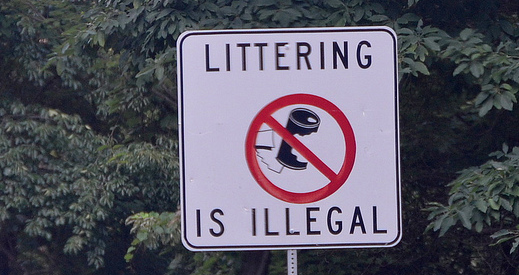Can We Cut Down On Litter By Taking Photos Of It Before We Toss It Out?

(afagen)
Working off the idea known as the Baader-Meinhof phenomenon and the frequency illusion, wherein a person sees something, then notices it more often the next time they come across it, the founder of Litterati thinks the same thing could work with litter, reports KQED.org.
So for example: You see a crumpled chip bag on the street, take a photo of it, and post it to Instagram using the hashtag #litterati. The litter goes in the garbage. You’ll then start seeing litter everywhere — and your social network pals might too, because of your post, and be inspired to clean things up as well.
It’s a shift in perception, the founder says, and it happened to him while walking with his kids in the woods one day.
“My daughter noticed a plastic tub of kitty litter in a creek. ‘Daaaaddy, that doesn’t go there.’ That was an eye-opening moment for me,” he said. “We have become desensitized to trash. Litter is so ubiquitous that for most of us it just fades into the background.”
He started to think about how he could use technology to decrease littering and came up with the Litterati idea, as a way to see and take responsibility for our messes.
“I was reminded of being a kid at summer camp,” he said. “Our director would instruct us to each pick up five pieces of trash. Suddenly you had 200 kids each picking up five pieces, and within a few minutes we had a much cleaner camp. So my idea was to apply that same crowdsource-cleaning behavior to the entire planet. That was the inspiration for Litterati.”
So far, users around the world have snapped pics (and hopefully threw out or recycled) more than 27,000 pieces of trash.
“Our goal is to create a “litter-free world,” the founder explains, “but I’m well aware that picking up litter doesn’t solve our trash problem. It does serve to shift consciousness, though, and we can use that newfound consciousness to inspire action from our neighbors, our communities, our governments, and the corporations we buy from, too.”
*And also, don’t throw burritos out the window:
#Digital Landfill [KQED.org]
Want more consumer news? Visit our parent organization, Consumer Reports, for the latest on scams, recalls, and other consumer issues.

